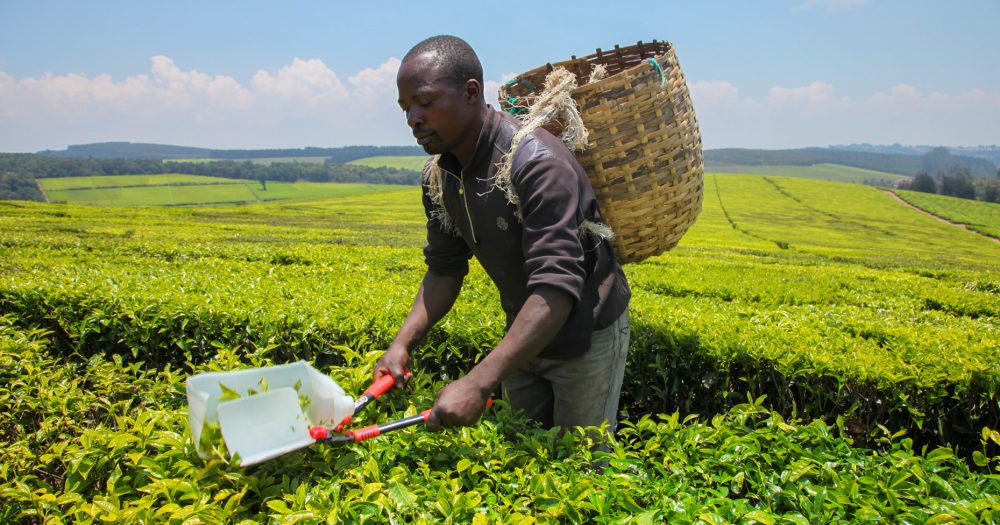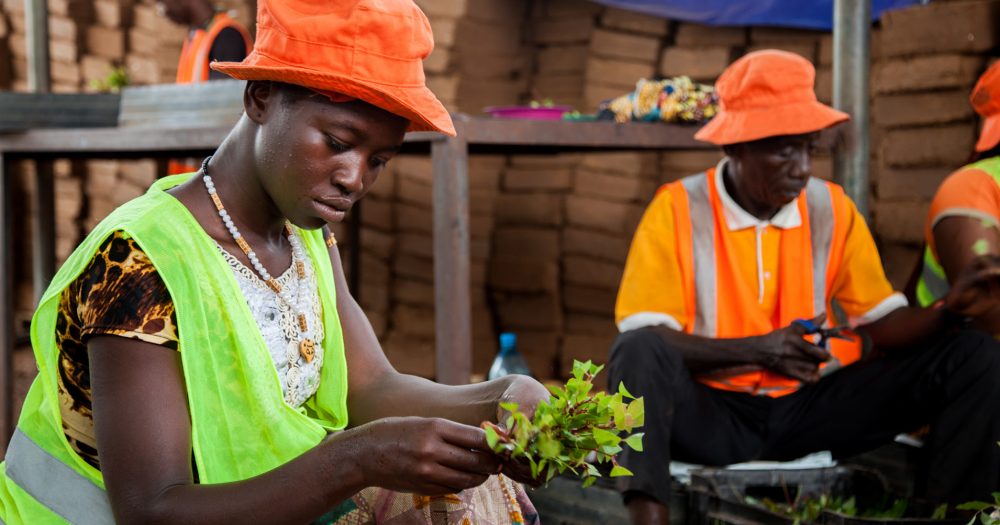This investment was made when British International Investment was named CDC Group.
Our investment
Description of the investment.
Description of the investment.
Our loan to Commercial Bank of Ceylon will facilitate lending to small and medium-sized enterprises (SMEs) and support climate projects in Sri Lanka.
Impact information
Applies to investments made from 2019 onwards. The tabs in this section define what we expect to achieve through the investment, assessing the potential impact of the investment against six dimensions of impact. You can find more details on our methodology of assessing impact here.
Applies to investments made from 2019 onwards. The tabs in this section define what we expect to achieve through the investment, assessing the potential impact of the investment against six dimensions of impact. You can find more details on our methodology of assessing impact here.
What?
| Impact |
|---|
Our facility will support increased access to credit for SMEs and climate projects in a challenging macro-environment where there is lack of suitable funding given the long-term tenor needed. This is one of our first directed lending facilities, enabling us to better track the reach of our financing to priority segments and sectors. |
|
|
How?
| Primary | Secondary |
|---|---|
|
Our facility will enable the investee to extend greater credit to SMEs in the form of long-term and working capital loans. Increased credit will allow SME business owners to better manage risk and liquidity, contributing to improved business resilience, income, stability and business expansion. |
Our facility will enable the investee to extend credit to renewable and climate-supportive projects that will support the country’s ambitions of energy sufficiency and contribute to reducing greenhouse gas emissions. |
Who?
| Stakeholder | Geography | Characteristics |
|---|---|---|
| Owners and employees |
Sri Lanka |
Employees will be high/medium/low-skilled workers of mid to large-sized SMEs (average loan size $27,000). Key sectors reached include: manufacturing (17 per cent), services (16 per cent), imports/trading (23 per cent), wholesale/retail (11 per cent) (SME portfolio at Dec 2020). |
| Planet |
Global |
Projects financed include solar (20 per cent), resource efficiency (19 per cent), climate-smart agriculture (17 per cent), hydro (10 per cent), and environmentally friendly transportation projects (10 per cent) (Green book at Dec 2020). Sri Lanka is a relatively low emitter of greenhouse gas emissions globally, but is aiming for 100 per cent renewable energy generation by 2050, which will also contribute to the country’s growing energy demand and ambition to become energy self-sufficient by 2030. |
How much?
| Scale | Depth/Duration |
|---|---|
|
SMEs: $25 million growth in SME portfolio will support approximately 925 SME loans (hard target). 10 per cent annual growth of SME portfolio expected (soft target). Climate: $25 million green projects within 18 months of disbursement (hard target). Climate portfolio to make up 3 per cent of gross loan portfolio by 2025 (soft target). |
Duration: Five-year (SMEs) and seven-year (climate). |
Contribution/additionality
| Contribution/additionality |
|---|
|
Risk
Execution Risk
|
Environmental and social information
-
Environmental and social summary
A high-level description of the environmental and social aspects of the investment. This may include a summary of key environmental and social risks identified during environmental and social due diligence (ESDD); key elements of an environmental and social action plan (ESAP); or ways in which we plan to support the investee improve environmental and social standards, such as through their environmental and social management system (ESMS); as well as any other priority areas agreed with the investee.
-
Environmental and social risk
A risk category rating, which indicates the level of environmental and social risk associated with an investment. For an explanation of the categorisations used, see here. We consistently provide an environmental and social risk category for all investments screened from 2023 onwards.
Environmental and social summary
We agreed on an environmental and social (E&S) action plan focused on strengthening the existing E&S management system (ESMS), hiring an additional E&S specialist to implement the ESMS) and clarifying procedures for the use of independent E&S consultants for high E&S risk transactions.
Reporting and Complaints Mechanism
The Reporting and Complaints Mechanism allows anyone outside BII to report alleged breaches of the business integrity or environmental and social provisions of BII’s Policy on Responsible Investing. This includes breaches made by BII, a BII investee, or a portfolio company of a fund in which BII has invested. The Reporting and Complaints Mechanism Rules are available here. Reports and complaints can be submitted by email to reportsandcomplaints@bii.co.uk or by mail. See more details on our Reporting and Complaints Mechanism here.
For any other general enquiries contact us at enquiries@bii.co.uk
-
Key facts
- Last updated
:
When the last quarterly update of the website database occurred.
- March 2025
- Project number
:
An identifier number shared by investments in the same project.
- D4992
- Status
:
The current status of the investment (green flag for active and red flag for exited).
- Active
- Region
:
The geographical region where the country is located. We currently invest in Africa, South Asia, South East Asia and the Caribbean. In 2023, BII’s investment mandate was extended allowing it to invest in regional funds linked to Ukraine, with the majority of activity expected to begin post-war. Investments outside these regions were made prior to 2012 under previous investment mandates.
- South Asia
- Country
:
The countries where the investment delivers impact. Where impact is delivered in multiple countries, this is indicated.
- Sri Lanka
- Sector
:
We prioritise those sectors that facilitate development and need our capital the most. Our priority sectors contribute towards many of the Sustainable Development Goals. They range from investing in the power infrastructure that will provide people with better access to electricity, to investing in financial institutions that direct capital to the individuals and businesses that need it the most.
- Financial services
- Sub sector
:
The sub-sector that the investment is made into; this provides a more granular level of detail than the ‘sector’ information
- Banks
- Investment type :
- Debt
- Start date :
- August 2021
- Amount :
- $50m
- Currency of investment :
- USD
- Domicile
:
The company or investment fund’s place of incorporation.
- Sri Lanka
We provide capital in the following ways: directly – through direct equity, direct debt, guarantees and other non-intermediated financial instruments; and indirectly – principally through investment funds.
For direct investments and fund investments, this is the date BII committed capital to the investments. This is typically the date on which legal agreements are signed by all parties.
For the portfolio companies of our fund investments, this is the date (either the month or the quarter) on which the fund committed capital to the portfolio company.
For direct equity investments, this is the date at which British International Investment exited the investment.
For debt investments, this is the date at which the final debt repayment was made.
For funds, this is the date at which the fund was terminated.
For underlying fund investments, this is the date at which the fund manager exited the investment.
The total amount committed, per financial instrument, per investment, on the date BII becomes subject to a binding legal obligation to provide funding or assume a contingent liability. This information is provided in US dollars.
For direct investments, this is the amount that BII has committed to the business or project. For fund investments, this is the amount BII has committed to the fund.
The currency in which the investment was made.
- Climate finance
:
Indicates whether the investment is climate finance qualified or partially climate finance qualified and the type of climate finance (adaptation, mitigation or both). We define climate finance using the multilateral development bank (MDB) and the International Development Finance Club (IDFC) Common Principles climate finance methodology. See Common Principles for Climate Mitigation Finance Tracking and Common Principles for Climate Change Adaptation Finance Tracking. We provide the climate finance qualification and type for commitments from 2020 onwards, which is when we launched our Climate Change Strategy.
- Partially qualified
- Climate finance type
:
Mitigation: Indicates investments which, by avoiding or reducing GHG emissions or increasing GHG sequestration, contributes substantially to the stabilisation of GHG concentrations in the atmosphere – at a level which prevents dangerous anthropogenic interference with the climate system consistent with the long-term temperature goal of the Paris Agreement
Adaptation: Indicates investments aimed at preventing or reducing the risks or vulnerabilities posed by climate change and increasing climate resilience. This includes both adapted activities and enabling activities to manage and reduce physical climate risks
Dual: Indicates investments directed towards activities contributing to both climate change mitigation and climate change adaptation and meeting the respective criteria for each category
The climate finance type of the investment is determined at time of commitment.
-
- Mitigation
- Last updated


